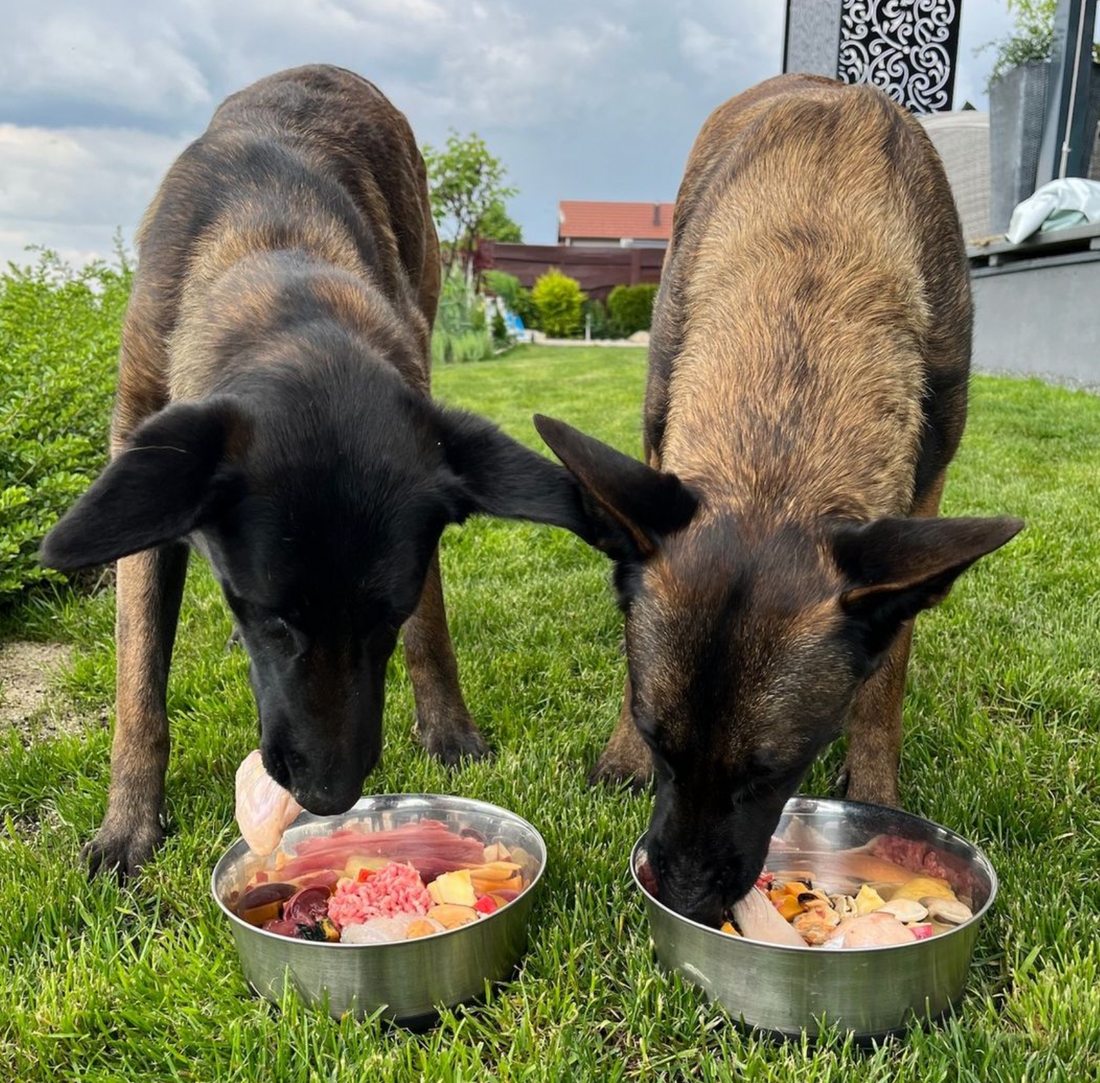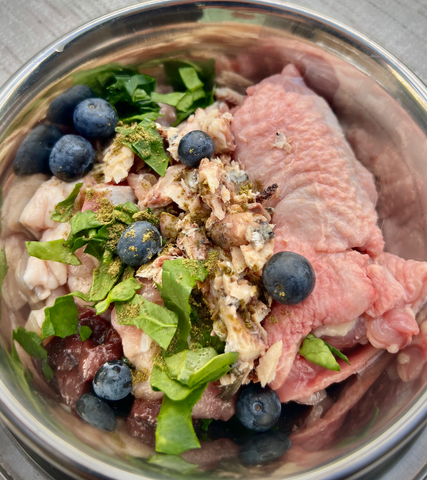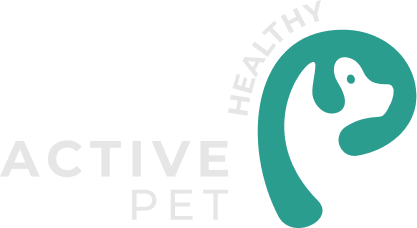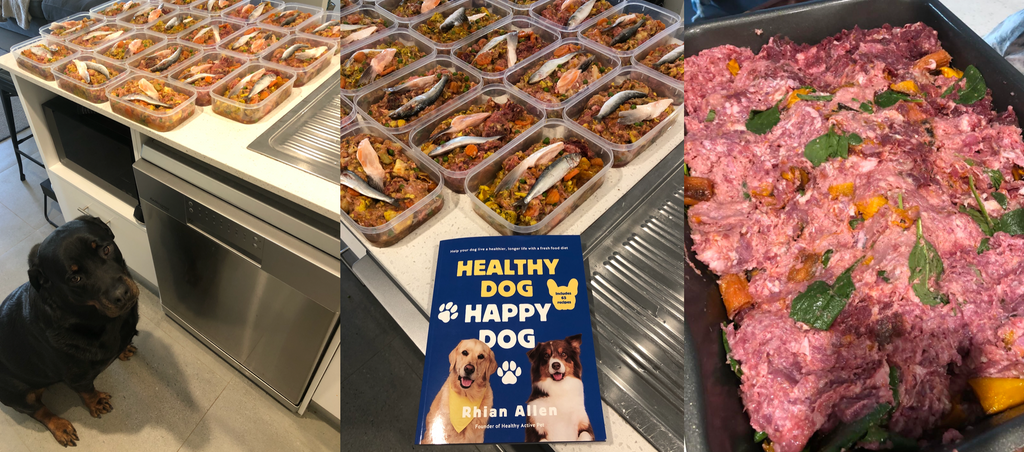
How diet affects anxiety in dogs
Welcome to our article on how diet can impact anxiety levels in our furry friends. As pet owners, we want our dogs to be happy and healthy, and their diet plays a crucial role in achieving this.
Anxiety in dogs is a common problem, affecting many Australian pups. In this article, we will explore the benefits of a raw feeding diet for reducing anxiety in dogs and improving their overall well-being.
Anxiety can manifest in many ways in dogs, from excessive barking and destructive behaviour to hiding or shaking. It can be caused by a range of factors, including past experiences, breed tendencies, and environmental triggers.
A well-balanced diet that supports a healthy nervous system can help alleviate anxiety and result in a calmer and happier state for your furry companion.
Key Takeaways:
- A dog's diet can impact their anxiety levels.
- Anxiety in dogs is a common problem in Australia.
- A raw feeding diet can help reduce anxiety and promote overall well-being.
- A well-balanced diet can support a healthy nervous system and lead to a calmer state.
- Consulting a veterinarian or canine nutritionist is essential before transitioning to a raw feeding diet.
You can also see our own pet nutritionist created recipes here that all meet the minimum AAFCO requirements

Understanding Dog Anxiety
As pet owners, we all want our furry friends to be happy and healthy. However, many dogs suffer from anxiety, which can affect their quality of life. Dog anxiety can manifest in a variety of ways, from destructive behaviour and aggression to excessive barking and licking.
It's important to recognise the signs of anxiety in dogs so that you can take appropriate measures to help them.

The Causes of Anxiety in Dogs
Anxiety in dogs can be caused by a variety of factors. Environmental triggers such as loud noises, changes in routine, and unfamiliar people or animals can all contribute to anxiety.
Past experiences, such as abandonment or abuse, can also lead to anxiety in dogs. Additionally, certain breeds may be more prone to anxiety than others. Understanding the potential causes of anxiety can help you identify the specific triggers that may be affecting your dog.
| Common Causes of Anxiety in Dogs | Examples |
|---|---|
| Environmental Triggers | Loud noises, changes in routine, unfamiliar people or animals |
| Past Experiences | Abandonment, abuse, neglect |
| Breed Tendencies | Herding breeds, working breeds, hunting breeds |
By understanding the potential causes of anxiety in dogs, you can take proactive steps to help prevent or manage your dog's anxiety.
The Link Between Diet and Anxiety
As dog owners, we want nothing but the best for our furry friends, including their mental well-being. Research has shown that a dog's diet plays a significant role in their anxiety levels. Certain nutrients and ingredients can have a positive or negative impact on their nervous system, affecting their overall mental state.
According to recent studies, dogs with anxiety may benefit from a well-balanced diet that contains adequate levels of essential nutrients such as vitamins, minerals, protein, and healthy fats. In contrast, an imbalanced or deficient diet may trigger anxiety symptoms.
Proper nutrition can support a dog's mental health by reducing inflammation, balancing their omega-fatty acids, and promoting a healthy gut microbiome, which can help reduce anxiety levels.
You can also see our own pet nutritionist created recipes here that all meet the minimum AAFCO requirements

The Role of Nutrition in Anxiety in Dogs
A dog's diet affects their mental state by influencing neurotransmitters and hormones that regulate mood and behavior. Serotonin, a neurotransmitter responsible for feelings of well-being, is produced in the gut, and its levels can be impacted by the types of food a dog eats.
Studies have shown that omega-3 fatty acids found in fatty fish and certain oils can help reduce anxiety in dogs and humans by modulating the production of hormones like cortisol, a known stress hormone. On the other hand, omega-6 fatty acids found in many commercial dog foods have been linked to greater anxiety levels.
A balanced diet can also provide antioxidants, probiotics, and prebiotics that support the production of healthy gut bacteria. A healthy gut microbiome can reduce inflammation, support immune function, and regulate neurotransmitters, all of which are known to impact anxiety in dogs.
The Importance of a Balanced Diet for a Healthy Nervous System
A balanced diet is crucial for a healthy nervous system in dogs. Nutrients like B vitamins, magnesium, and zinc can support the production of neurotransmitters, while carbohydrates provide energy for the brain to function efficiently.
Moreover, high-quality protein sources, such as lean meats and fish, can support the production of neurotransmitters and brain growth by providing essential amino acids that cannot be synthesised by a dog's body.
Nutrients Impacting Anxiety Levels in Dogs
| Nutrient | Impact on Anxiety | Food Sources |
|---|---|---|
| Omega-3 fatty acids | Reduce anxiety levels | Fish (salmon, sardines), flaxseed oil, chia seeds |
| Omega-6 fatty acids | Increase anxiety levels | Common in many commercial dog foods |
| B vitamins | Supports neurotransmitter production | Fish, meat, eggs, dairy, leafy greens |
| Magnesium | Supports neurotransmitter production | Leafy greens, nuts, seeds, beans, whole grains |
| Zinc | Supports neurotransmitter production and brain growth | Meat, fish, dairy, eggs, nuts, whole grains |
It's important to remember that each dog's nutritional needs may vary depending on their breed, size, age, and individual health conditions. However, a well-balanced diet with adequate levels of essential nutrients can significantly impact their anxiety levels, promoting a calmer and healthier state of being.
Introduction to Raw Feeding Diet
At its core, a raw feeding diet for dogs involves providing unprocessed and uncooked foods for our furry friends. Also known as BARF (Biologically Appropriate Raw Food), this diet is gaining popularity among pet parents seeking a natural and balanced approach to nutrition.
The benefits of a raw diet go beyond just satisfying a dog's taste buds. Research has shown that it can have a positive impact on various aspects of canine health, including reducing anxiety. By providing a diet that is rich in necessary nutrients and free from artificial additives, we can help nurture a calmer and happier Australian pup.
| Benefits of Raw Feeding Diet for Dogs |
|---|
| Promotes healthier skin and coat |
| Supports a healthier immune system |
| Enhances cognitive function |
| Improves digestion and reduces the risk of digestive issues |
| Reduces inflammation, which can contribute to anxiety |
| Eliminates artificial additives, preservatives, and fillers |
The nutritional benefits of raw feeding are numerous, making it a great choice for dogs of all ages and breeds. From essential fatty acids to probiotics for gut health, a raw diet provides the necessary nutrients to support a dog's overall well-being.
If you're considering making the switch to a raw feeding diet for your dog, it's important to do so gradually and under the guidance of a veterinarian or qualified canine nutritionist. By taking a careful and informed approach, you can help ensure a smooth transition and set your pup up for a happy and healthy life.
Nutritional Benefits of Raw Feeding
If you're considering a raw feeding diet for your dog, there are many nutritional benefits to take into account. Here are some of the key nutrients found in raw diets that support overall well-being and can help reduce anxiety:
| Nutrient | Function | Food Sources |
|---|---|---|
| Essential fatty acids (EFAs) | Support healthy brain function and reduce inflammation | Fatty fish, organ meats, flaxseed oil |
| Probiotics | Promote a healthy gut microbiome and boost immune function | Raw fermented vegetables, raw cheese, kefir |
| Fiber | Aids in digestion and promotes feelings of fullness | Different vegetables, coconut, nuts |
| Amino acids | Building blocks of protein that support tissue growth and repair | Quality meat sources, eggs, cheese |
Raw feeding also eliminates the artificial additives and preservatives found in many commercial dog foods, reducing potential triggers for anxiety. By providing a balanced, natural diet, you can help keep your dog calm and healthy.
Reducing Inflammatory Triggers
Chronic inflammation is a common problem in dogs that can lead to a range of health issues, including anxiety. When a dog's body is in a constant state of inflammation, it can impact their mental health and overall well-being.
A raw feeding diet can help reduce inflammatory triggers by eliminating common allergens. Common allergens such as grains, artificial additives, and preservatives are known to cause inflammation in dogs. By feeding your dog a natural, balanced diet, free of these inflammatory triggers, you can help reduce the risk of chronic inflammation.
On top of that, a raw feeding diet provides anti-inflammatory nutrients that can soothe existing inflammation. Ingredients such as fatty acids, curcumin (found in turmeric), vitamin E, and other antioxidants found in raw foods can help support a healthy, calm state in your dog.
Foods to Avoid
If your dog is experiencing inflammation, consider avoiding the following foods:
- Grains, including wheat, corn, and rice
- Artificial additives, such as preservatives and artificial colorings
- Processed foods, such as kibble and canned foods
- Dairy products, including cheese and yogurt
By following a raw feeding diet, you can reduce your dog's risk of chronic inflammation and improve their overall mental health.
Balancing Omega Fatty Acids
Omega-3 fatty acids are essential for both mental and physical health in dogs. These fatty acids play a crucial role in cognitive function and have been shown to help reduce anxiety in dogs.
In a raw feeding diet, the balance of omega fatty acids can be achieved by including fatty fish, such as salmon and sardines, and organ meats like liver. These foods are rich in omega-3 fatty acids and can help reduce inflammation and improve brain function.
| Food Sources of Omega-3 Fatty Acids | Amount of Omega-3 (per 100g) |
|---|---|
| Salmon | 2.2g |
| Sardines | 1.5g |
| Organ meats (e.g. liver) | 0.5g |
In addition to omega-3 fatty acids, a raw feeding diet also includes other omega fatty acids like omega-6 and omega-9. It's important to maintain a balance between these different types of fatty acids to ensure optimal health benefits for your dog.
By providing a raw feeding diet, we can ensure our dogs get the proper balance of omega fatty acids to support their mental well-being and overall health.
Promoting Gut Health
The gut-brain connection is well-established, and it's no secret that a healthy gut is vital for overall well-being. Did you know that an imbalanced gut microbiome can also contribute to anxiety in dogs? This is where a raw feeding diet can make a big difference. By providing natural sources of fiber and probiotics, a raw diet can help promote a healthy gut environment and reduce anxiety in Australian dogs.
Fiber, which is found in fruits and vegetables, promotes healthy digestion and bowel movements, which can have a positive impact on a dog's emotional state. Similarly, probiotics can help restore the balance of good bacteria in the gut, reducing inflammation and improving overall gut health. A healthy gut means a healthier, happier dog.
Why the Gut Matters
The gut contains a complex network of nerves and neurons, which is why it's often referred to as the "second brain". This gut-brain axis is a two-way communication channel that allows the gut to send signals to the brain and vice versa. This means that an imbalanced gut can send negative signals to the brain, leading to anxiety and other emotional issues in dogs.
Raw Diet and Gut Microbiome
A raw feeding diet can provide the essential nutrients needed for a healthy gut microbiome. Raw meat, organs, and bones contain natural sources of probiotics that can help replenish friendly bacteria in the gut. This can lead to a more balanced gut environment, reducing inflammation and helping alleviate anxiety in Australian dogs.
It's important to note that a balanced raw diet should also include fruits, vegetables, and other sources of fibre. These provide prebiotics, which are essential for feeding the good bacteria in the gut and helping them thrive.
Eliminating Artificial Additives
Commercial dog food often contains artificial additives and preservatives that can be harmful to your furry friend's mental and physical health. These additives have been linked to anxiety and other behavioural problems in dogs, undermining their calmness and happiness. That's why switching to a raw feeding diet can make a significant difference in reducing the potential triggers for anxiety by providing a natural and balanced diet that is free of synthetic supplements.
With a raw feeding diet, you can be sure that your dog is consuming only the highest quality ingredients that are free of harmful substances. By eliminating the synthesised additives and preservatives and feeding dogs only what nature intended, owners can help reduce anxiety while providing complete nutrition to their pets.
Transitioning to a Raw Feeding Diet
Transitioning your dog to a raw feeding diet can seem daunting, but with proper planning and preparation, it can be a smooth and successful process. Here are some essential tips and guidance to help you through this transition:
Start Slowly
It's important to ease your dog into the raw feeding diet gradually. Start by introducing small, easily digestible meals and gradually increase the amount over a few days to a week. This can help prevent any digestive upsets and allow your dog's system to adjust to the new diet.
Research and Educate Yourself
Before switching to raw feeding, it's imperative to conduct extensive research and educate yourself on the topic. This includes understanding the nutritional requirements of your dog's breed, size, and age, as well as sourcing high-quality meats and vegetables that are appropriate for your dog's dietary needs.
You can see HEAPS of information on our website and in our pet nutritionist created recipes here that all meet the minimum AAFCO requirements
Variety is Key
Just like humans, dogs require a varied diet to ensure they receive all the essential nutrients they need. Incorporating a range of different meats, fruits, and vegetables into your dog's raw feeding diet can help achieve this. A helpful tip is to switch up the type of meat every few weeks to ensure your dog is receiving a diverse range of nutrients.
Invest in Appropriate Equipment
Switching to a raw feeding diet may require you to invest in new equipment, such as a high-quality meat grinder or food processor, to ensure you can prepare and portion meals efficiently. Additionally, it's important to be aware that raw food preparation requires strict hygiene practices, including washing all equipment and surfaces thoroughly after every use.
Conclusion
We hope this article has been informative and helpful in understanding how diet can impact anxiety in dogs. As dog lovers, we want to provide our furry friends with the best care possible, and one way to do that is through a raw feeding diet.
By choosing natural, unprocessed foods, we can help our dogs achieve a balanced and healthy diet that supports their mental and physical well-being. Not only does a raw feeding diet offer a range of essential nutrients, but it also eliminates potential triggers for anxiety, such as artificial additives and allergens.
While transitioning to a raw feeding diet may take some planning and consideration, the potential benefits for your dog are well worth the effort. We encourage you to seek professional advice from a veterinarian or canine nutritionist to ensure you make the best choices for your dog's specific needs.
Embrace the power of natural nutrition and help your dog live a happy, anxiety-free life. Together, let's give our furry Aussie companions the love and care they deserve.
You can also see our own pet nutritionist created recipes here that all meet the minimum AAFCO requirements

FAQ
What is dog anxiety?
Dog anxiety refers to a state of stress, fear, or unease experienced by dogs. It can manifest as various behaviours such as excessive barking, destructive chewing, or aggression.
What are the causes of anxiety in dogs?
There are several potential causes of anxiety in dogs, including environmental triggers, past traumatic experiences, separation from the owner, or certain breed tendencies.
How does diet affect anxiety in dogs?
Diet plays a significant role in a dog's mental well-being. Certain nutrients and ingredients found in a well-balanced diet can either contribute to or alleviate anxiety in dogs.
What is a raw feeding diet?
A raw feeding diet, also known as a raw diet or BARF (Biologically Appropriate Raw Food), consists of feeding dogs uncooked, unprocessed foods. This includes raw meats, bones, fruits, and vegetables.
What are the benefits of a raw feeding diet for reducing anxiety?
A raw feeding diet provides dogs with a range of nutritional benefits that can help reduce anxiety. These include essential fatty acids, balanced omega fatty acids, and gut health-promoting probiotics.
How can a raw feeding diet reduce inflammatory triggers?
A raw feeding diet can reduce inflammatory triggers by eliminating common allergens found in commercial dog foods and providing anti-inflammatory nutrients. This can lead to a calmer state for dogs and reduce anxiety.
How does a raw feeding diet promote gut health?
A raw feeding diet promotes gut health by providing probiotics and fiber, which help maintain a healthy balance of gut bacteria. A healthy gut microbiome is essential for reducing anxiety in dogs.
Does a raw feeding diet eliminate artificial additives?
Yes, a raw feeding diet eliminates artificial additives and preservatives commonly found in commercial dog foods. This reduces potential triggers for anxiety and behavioural problems in dogs.
How can I transition my dog to a raw feeding diet?
Transitioning your dog to a raw feeding diet requires careful planning and consideration. It's best to start by gradually introducing raw foods and seeking guidance from a veterinarian or a qualified canine nutritionist.
Should I consult a professional before starting a raw feeding diet?
Yes, it is important to consult a veterinarian or a qualified canine nutritionist before starting your dog on a raw feeding diet. They can provide personalised advice and guidance based on your dog's specific needs.



